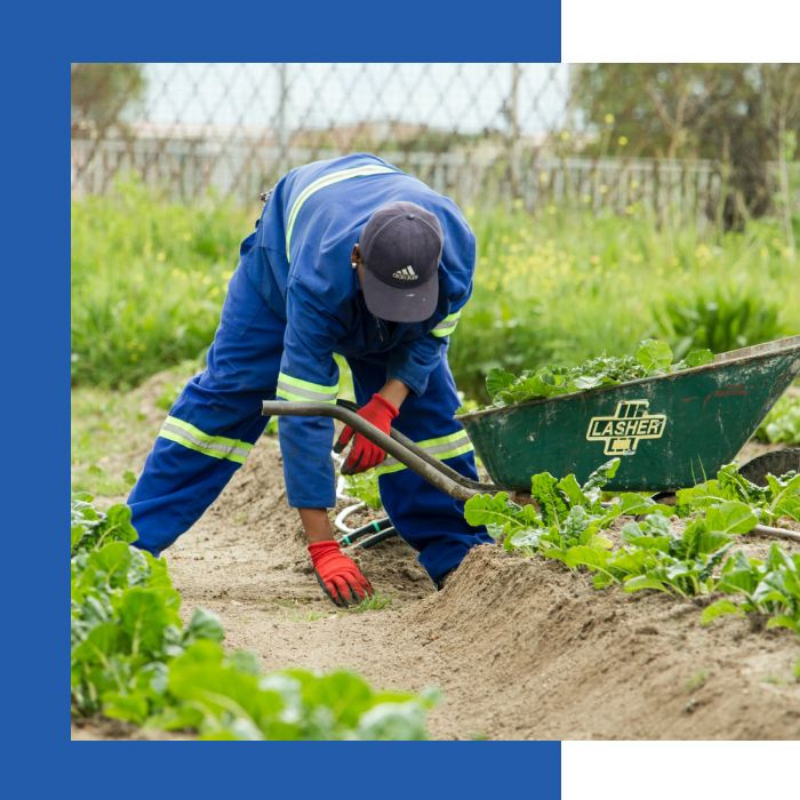Discover the taste of quality with Full Circle Farms‘ USDA-certified organic vegetables. Grown sustainably on over 2,000 acres in Longmont, Colorado, our produce is handpicked to ensure freshness and flavor. Each variety is cultivated with care, utilizing advanced irrigation techniques for optimal growth. Our commitment to sustainability not only nourishes your body but also supports the environment. Choose Full Circle Farms for all-natural, delicious vegetables that enhance your meals and promote a healthy lifestyle. Experience the difference of farm-fresh produce delivered directly to your table—because you deserve the best nature has to offer!
Description
The global food system is at a turning point. With rising consumer awareness about health, climate change, and sustainability, organic farming has emerged as a major force. Yet, one of the persistent questions has been whether organic farms can scale up to meet broader demand while maintaining ecological integrity.
Full Circle Farms, located in Longmont, Colorado, offers a compelling answer. Since 2003, this farm has cultivated more than 100 USDA-certified organic crops across over 2,000 acres of land. By balancing scale with sustainability, Full Circle has become a case study in how modern agriculture can integrate environmental stewardship, economic viability, and community engagement.
This research blog explores the origins, practices, challenges, and significance of Full Circle Farms in the larger agricultural landscape.
Origins and Mission
Full Circle Farms was established in 2003 with a vision to cultivate healthy, organic produce while respecting natural systems. From the outset, the farm pursued USDA organic certification, demonstrating its commitment to standards that exclude synthetic pesticides, fertilizers, and genetically modified organisms.
Its mission can be summarized in four pillars:
- Sustainability — ensuring farming practices restore rather than deplete the land.
- Diversity — producing a wide array of crops for ecological resilience and consumer variety.
- Accessibility — making organic food available to local and national markets.
- Community connection — fostering relationships with consumers through direct engagement.
This philosophy continues to shape operations two decades later.
Geography and Land Use
Full Circle Farms operates in Longmont, Colorado, situated near Longs Peak in the Rocky Mountain watershed. This location influences the farm in two critical ways:
- Soil and climate: The semi-arid climate requires efficient irrigation and drought resilience.
- Water resources: Access to rivers and reservoirs provides irrigation opportunities, though subject to Colorado’s complex water rights.
The farm manages more than 2,000 acres, a mix of owned property and land leased from Boulder County Open Space. This dual structure reflects a model of public-private partnership, where private farming is aligned with conservation goals.
Irrigation and Water Practices
Colorado agriculture faces chronic water scarcity. Full Circle employs a flexible irrigation system to manage this resource responsibly.
- Drip irrigation: Minimizes waste by delivering water directly to plant roots.
- Pivot irrigation: Covers large tracts of land efficiently, often used for grains and forage.
- Solid-set irrigation: Provides consistent coverage for specific vegetable plots.
- Flood irrigation: Used selectively in areas where it remains effective.
By tailoring water systems to crop needs, the farm maximizes efficiency and adapts to fluctuating conditions.
Crop Diversity and Soil Stewardship
Crop diversity is both a market strategy and an ecological tool for Full Circle Farms.
Crop Range
The farm grows more than 100 types of vegetables, including leafy greens, root crops, and seasonal specialties like pumpkins and squashes. It also cultivates grains, grass hay, and alfalfa.
Ecological Value
- Crop rotation replenishes soil nutrients, disrupts pest cycles, and reduces disease risks.
- Forage crops like alfalfa restore nitrogen naturally.
- Diverse planting systems encourage pollinators and soil microbial health.
This approach aligns with research showing that biodiversity in farming systems enhances long-term soil fertility and yield stability.
Products and Market Distribution
Products
The farm’s offerings span a wide spectrum: greens, root vegetables, squashes, pumpkins, and rotation crops like grains and hay. Pumpkins are particularly notable, drawing consumer attention during fall harvest seasons.
Distribution Channels
Full Circle maintains a multi-channel sales approach, including:
- Wholesale supply to regional and national companies.
- Farmers markets that connect directly with communities.
- A seasonal farm stand each October featuring fresh-picked produce.
- Partnerships with local food networks and agritourism ventures.
This hybrid model ensures financial stability and direct consumer engagement.
Sustainable Practices
Organic Certification
USDA certification is central to Full Circle’s operations, requiring strict adherence to ecological farming standards. This certification process includes regular audits, detailed record-keeping, and compliance with soil and pest management rules.
Soil Management
Soil health is prioritized through crop rotations, composting, and reduced tillage practices. These methods enhance soil carbon storage and long-term fertility.
Pest Management
Integrated Pest Management (IPM) strategies reduce reliance on chemicals by using natural predators, crop diversification, and timing strategies.
Land Stewardship
By leasing land from public agencies, Full Circle reinforces its role in broader conservation systems, ensuring that farming coexists with ecological protection.
Strengths of Full Circle Farms
- Scale with certification: Few organic farms sustain operations across thousands of acres while retaining USDA certification.
- Crop diversity: More than 100 varieties support resilience and broaden market reach.
- Water efficiency: Multiple irrigation systems balance conservation with crop productivity.
- Community visibility: Markets, stands, and seasonal events build trust and brand presence.
- Economic resilience: Wholesale contracts combined with retail sales protect against market volatility.
- Experienced staff: Longstanding expertise ensures consistent quality and sustainability.
Limitations and Risks
- Water scarcity: A constant challenge in semi-arid Colorado.
- High operational costs: Organic farming requires greater labor and certification expenses.
- Logistical complexity: Supplying local and national buyers requires advanced distribution systems.
- Market volatility: Organic price premiums can fluctuate, affecting profitability.
- Soil health challenges: Maintaining fertility across large acreage is resource-intensive.
- Climate variability: Unpredictable weather patterns (hail, frost, drought) pose ongoing risks.
Economic and Social Impact
Local Economy
Full Circle employs field crews, packhouse workers, and logistics teams, providing jobs that support the local economy. Seasonal hiring during harvest expands employment further.
Food Supply
By producing at scale, the farm contributes significantly to organic food availability both locally and nationally.
Environmental Benefits
Avoiding synthetic inputs reduces chemical runoff, while crop rotations improve biodiversity and soil health.
Community Engagement
Seasonal events, farm stands, and farmers markets foster strong connections between the farm and its consumers, deepening awareness of sustainable agriculture.
Place in the Organic Movement
Full Circle Farms demonstrates that organic agriculture can be both large-scale and sustainable. It sits between small, local farms and industrial-scale operations, offering a hybrid model that meets consumer demand while retaining ecological commitments.
Its success challenges assumptions that organic farming must remain small and boutique. Instead, it shows how certification, rotation, and sustainability practices can scale responsibly.
Agritourism and Public Connection
Full Circle engages in agritourism through seasonal pumpkin harvest events and farm stand activities. These serve multiple purposes:
- Supplemental income for the farm.
- Educational experiences for visitors.
- Strengthened consumer trust.
- Cultural traditions that reinforce ties between food and community.
Agritourism helps bridge the gap between producer and consumer, creating transparency in farming practices.
Lessons from Full Circle Farms
- Diversification protects against risk in both crops and revenue.
- Multiple irrigation systems improve resilience to water shortages.
- Direct-to-consumer sales build loyalty and brand identity.
- Scaling sustainably is possible with proper stewardship.
- Leadership and structure are critical to managing complexity.
Future Outlook
Full Circle Farms faces a future shaped by both promise and pressure.
Opportunities
- Expanding into value-added products like packaged produce or preserves.
- Building CSA subscription models for steady consumer engagement.
- Adopting regenerative practices such as cover cropping, no-till farming, or agroforestry.
- Leveraging carbon credit markets for ecosystem services.
- Using precision agriculture to optimize yields and minimize inputs.
Challenges
- Navigating water scarcity and climate unpredictability.
- Maintaining organic standards across large acreage.
- Balancing ecological practices with economic realities in competitive markets.
Conclusion
Full Circle Farms stands as a testament to the potential of organic agriculture at scale. With more than two decades of experience, the farm has shown that USDA certification, crop diversity, and ecological stewardship can be maintained across thousands of acres.
By combining wholesale supply with community engagement, and by managing soil and water carefully, Full Circle offers a model for the next generation of sustainable farming. Its story demonstrates that organic agriculture need not remain marginal — it can thrive, expand, and influence the future of the global food system.
Frequently Asked Questions (FAQs)
1. Is Full Circle Farms certified organic?
Yes, the farm is USDA-certified organic and adheres strictly to organic standards.
2. How many types of crops does the farm grow?
More than 100 varieties of vegetables are cultivated, alongside grains, hay, and alfalfa.
3. How much land does the farm manage?
Over 2,000 acres in Longmont, Colorado, both owned and leased.
4. What irrigation systems are used?
Drip, pivot, solid set, and flood irrigation systems, chosen based on crop type.
5. Where can people buy their produce?
Through wholesale distributors, farmers markets, and a seasonal on-farm stand.
6. Why does the farm grow hay and alfalfa?
These crops are integral to soil rotation strategies, improving fertility and reducing pest cycles.
7. What challenges does Full Circle face?
Water scarcity, high costs of organic operations, logistics, and climate variability.
8. Does the farm engage in community activities?
Yes, including markets, farm stands, and agritourism such as pumpkin harvest events.
9. How does the farm impact the environment?
By reducing chemical runoff, increasing biodiversity, and regenerating soil through sustainable practices.
10. What makes Full Circle significant in U.S. agriculture?
It proves that organic farming can be large-scale, sustainable, and commercially viable at the same time.




